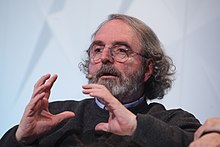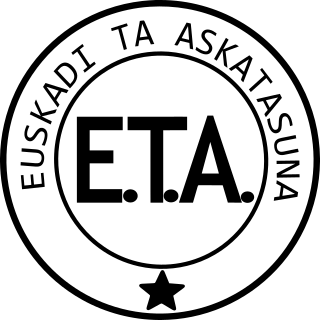
ETA, an acronym for Euskadi Ta Askatasuna, was an armed Basque nationalist and far-left separatist organization in the Basque Country between 1959 and 2018, with its goal being independence for the region. The group was founded in 1959 during the era of Francoist Spain, and later evolved from a pacifist group promoting traditional Basque culture to a violent paramilitary group. It engaged in a campaign of bombings, assassinations, and kidnappings throughout Spain and especially the Southern Basque Country against the regime, which was highly centralised and hostile to the expression of non-Castilian minority identities. ETA was the main group within the Basque National Liberation Movement and was the most important Basque participant in the Basque conflict.
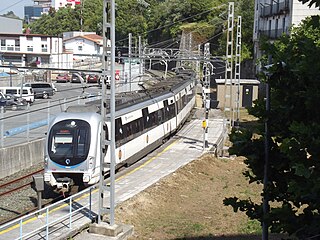
Euskotren Trena, formerly known just as Euskotren is a commuter, inter-city and urban transit train-operating company that operates local and inter-city passenger services in the provinces of Biscay and Gipuzkoa, in the Basque Country, Spain. It is one of the four commercial brands under which Euskotren operates, as a public company managed by the Basque government. The entire 181.1-kilometre (112.5 mi) network uses 1,000 mm narrow gauge rail tracks which have been owned by the Basque Government since their transferral from the Spanish government; the rail tracks and stations were part of the FEVE network until its transferral. Euskotren Trena also operates the Donostia/San Sebastián metro under the brand Metro Donostialdea.

The Basque Nationalist Party, officially Basque National Party in English, is a Basque nationalist and regionalist political party. The party is located in the centre of the political spectrum.

Sabino Policarpo Arana Goiri, Sabin Polikarpo Arana Goiri, or Arana ta Goiri'taŕ Sabin (self-styled), was a Spanish writer and the founder of the Basque Nationalist Party (PNV). Arana is considered the father of Basque nationalism.

On 20 December 1973, Luis Carrero Blanco, the Prime Minister of Spain, was assassinated in a car bombing set up by the Basque separatist group ETA. The assassination, also known by its code name Operación Ogro, is considered to have been the biggest attack against the Francoist State since the end of the Spanish Civil War in 1939 and had far-reaching consequences within the politics of Spain.

Juan de Jáuregui was killed trying to assassinate Prince William I of Orange. He was a Biscayan by his birth in Bilbao.

José Antonio Ardanza Garro was a Spanish politician who became the second elected Lehendakari after the approval of the Statute of Autonomy. He was in office between 1985 and 1999.

Joseba Sarrionandia Uribelarrea is a Basque writer who has published a large number of books of poetry and short stories, as well as novels. He has been awarded on numerous occasions for his work, and is nowadays a respected literary personality in the Basque Country.
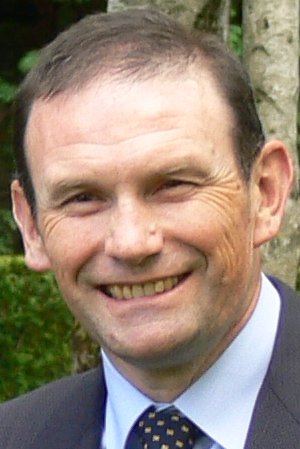
The 2009 Basque regional election was held on Sunday, 1 March 2009, to elect the 9th Parliament of the Basque Autonomous Community. All 75 seats in the Parliament were up for election. The election was held simultaneously with a regional election in Galicia. It would be the first time that the elections for two of the Spanish "historical regions"—namely, those comprising Andalusia, Catalonia, Galicia and the Basque Country itself—were held simultaneously. This would evolve into an unwritten convention in subsequent years, with Basque and Galician elections being held concurrently in 2012, 2016 and 2020.

The 2001 Basque regional election was held on Sunday, 13 May 2001, to elect the 7th Parliament of the Basque Autonomous Community. All 75 seats in the Parliament were up for election.

The 1998 Basque regional election was held on Sunday, 25 October 1998, to elect the 6th Parliament of the Basque Autonomous Community. All 75 seats in the Parliament were up for election.

Spanish unionism is a term used mainly by the Basque nationalism and Catalan independence movements to refer to the political attitude which opposes independence and favours the continuity of the Kingdom of Spain as a single united nation-state.

The 2012 Basque regional election was held on Sunday, 21 October 2012, to elect the 10th Parliament of the Basque Autonomous Community. All 75 seats in the Parliament were up for election. The election was held simultaneously with a regional election in Galicia. Lehendakari Patxi López announced the parliament's dissolution half a year ahead of schedule as a result of the People's Party (PP) withdrawing their support from his government, prompting Galician president Alberto Núñez Feijóo, who had been scheduling a snap election in Galicia to be held at some point throughout late 2012, to make his decision to have a simultaneous vote.
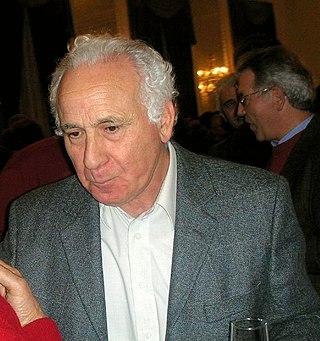
Joxe Azurmendi Otaegi is a Basque writer, philosopher, essayist and poet. He has published numerous articles and books on ethics, politics, the philosophy of language, technique, Basque literature and philosophy in general.

The 2024 Basque regional election was held on Sunday, 21 April 2024, to elect the 13th Parliament of the Basque Autonomous Community. All 75 seats in the Parliament were up for election.

Edurne Uriarte Bengoechea is a Spanish politician, political scientist, and sociologist. She is a member of the Spanish Congress of Deputies for the People's Party of Spain, representing The Constituency of Madrid.

Bingen Zupiria is a Spanish politician affiliated with the Basque National Party. As of 28 November 2016, he serves as Minister of Culture and Language Policy in the Basque Government. Between 2016 and 2020, he served in this position in the Second Urkullu Government led by Iñigo Urkullu and as of 8 September 2020, he serves in this position in the Third Urkullu Government. He also serves as government spokesperson.

Joseba Arregui Aramburu was a Spanish politician, theologian, and academic.

María del Mar Blanco Garrido is a Spanish People's Party (PP) politician. She has served as a member of the Basque Parliament (2009–2012), Congress of Deputies (2016–2019) and Assembly of Madrid.
Francisco Juaristi Larrinaga, known as Patxi Juaristi, is a Basque sociologist, linguist, writer and university professor, current vice-rector of the University of the Basque Country.
